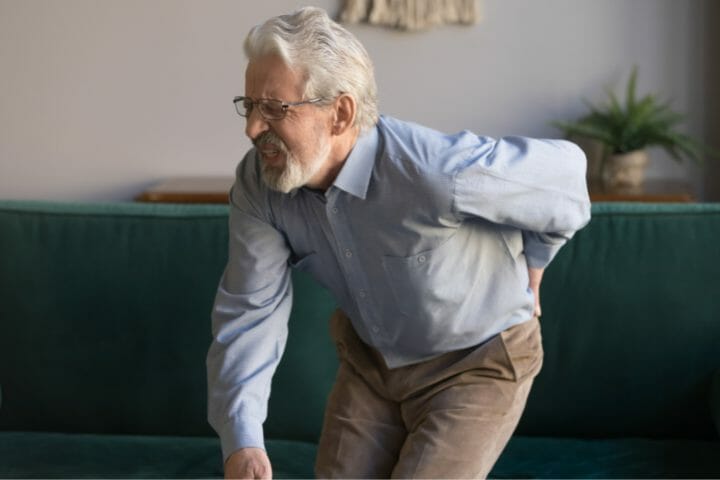Low sodium is common in the elderly, but did you know it can cause major problems? This article shows you how to treat low sodium in the elderly, the various techniques (both natural and medicinal) and gives you a lot of information on the topic.
Contents
Sodium is one of the essential nutrients for humans and animals likewise, and both its deficiency and excess can prove to be fatal. Sodium is an important nutrient, and its proper level must be maintained in every age category, especially in children and the elderly.
Sodium is necessary for the appropriate working of the human metabolism system and good working of muscles and tissues. Studies have shown that low sodium levels are a common problem as we age. Let us look into the why and how of treating low sodium in the elderly. We will also look at how to keep sodium levels up in elderly.

What is Hyponatremia?
Hyponatremia is a medical state when the sodium level inside the body falls lower than usual, causing the body to hold excess water, diluting the blood. This is caused when the sodium level falls too familiar in our blood and requires professional medical care to treat this disease.
The sodium in the blood can fall due to multiple reasons, and the most common behind them is the loss of too much body fluid or the deficient intake of sodium. With a proper sodium intake and a healthy lifestyle, this problem can be easily avoided.
Hyponatremia can be a fatal problem for the elderly who already have been going through treatment or suffering from illness.
From minor issues at first like confusion and lethargy, it can give rise to more significant problems such as coma and even death if left unchecked. The sodium level must be checked from time to time in the case of elders to avoid an increase in this problem.

How Common is Hyponatremia?
Hyponatremia is a widespread problem among the elderly above 60 years of age, and it can also occur in younger and older adults but can easily be treated. It can also happen in newly born babies who suffer from mal-nutrient or improper food intake.
It can also be caused in teens and younger children, but those cases are rare. With a healthy diet and balanced sodium consumption, the chances of Hyponatremia happening in teens are very low.
You might also like to read: Pedialyte Vs. Gatorade For Elderly – Preventing Dehydration Among Seniors
Prevalence of Hyponatremia in the Elderly
Hyponatremia is caused due to the improper water balance in the human body. In the case of the elderly, they are more exposed to medication which can cause wrong water balance in their body.
A wide range of drugs affects the metabolism and digestion system and can cause problems like excessive urination, sweating, and others.
Studies have shown that nearly 47% of older adults above 60 years of age suffer from Hyponatremia. The incidence is so high because older adults have higher exposure to medicines and a weaker metabolism.
The elders who have been suffering from problems like Diarrhea, liver problems, and kidney problems, are more likely to suffer from Hyponatremia.

Symptoms of Hyponatremia
In a minor case of Hyponatremia, the patient may see problems like
- Dizziness
- Fatigue
- Headaches
- Insufficient urine production, and related pain.
If the headache, fatigue, and nausea increase, the patient must seek medical attention as soon as possible.
If the case is more severe the person may feel many neurological problems and significant issues like :
- Brain swelling
- Breathing problems
- Drowsiness
- Loss in strength and irritability
- Suffocation, and other brain related issues.
What Causes Low Sodium In the Elderly?
Low Sodium levels can be caused due to a wide range of reasons. In the elderly, it could be due to their previous medical history and physical condition.
The sodium level inside the human body also decreases with age, and it is common for elders to have low sodium levels compared to their younger selves.
Due to the loss of sodium in the body, the electrolyte level of the body disbalances and can give rise to many severe problems. Excessive water intake can also cause the dilution of sodium levels in the blood.
The primary reasons behind Hyponatremia is given below
- Kidney or Liver Damage
- Diarrhea
- Excessive Urination
- Loss of blood
- Improper nutrient Intake
You might also like to read: What Causes High Potassium Levels In Elderly?
What is Normal Sodium Level In the Elderly
The sodium level inside the body is measured based on many different scales. In most cases, the serum sodium level is calculated to determine the level of sodium.
The normal range of serum sodium level is determined between 135 to 142 mmol/L. In case the level of serum sodium falls below 135 mmol/L, it causes Hyponatremia.
The occurrence of increases with age, and different fluctuations in sodium levels also occur as the age increases. In most cases, the sodium level is maintained efficiently, but it doesn’t revert to normal, then the patient should seek medical attention as soon as possible.

What Happens With Increase in Sodium Level?
Increase in sodium level is rare, but it still happens when the water concentration in the body drops below the ideal range. In those cases, Hypernatremia occurs, with symptoms and effects similar to dehydration.
In the case of Hypernatremia, the patient tends to drink more water to balance out their water level. It can also be caused due to issues like kidney dysfunction, Diarrhea, excessive precipitation, or urination. It can also be caused due to the excessive intake of sodium in the body.
Complications associated with Hyponatremia in the Elderly
Hyponatremia is a common problem among the elders, but if left unchecked, it can give rise to some severe issues and even lead to death.

How dangerous is low sodium in elderly?
In the case of acute Hyponatremia, the sodium level falls rapidly inside the body, causing a rapid alternation in the body’s electrolyte balance and many other associated problems.
Rapid fall in sodium levels can cause brain swelling, which can cause coma and even lead to death in some cases. The brain-related issues occurring from Hyponatremia are more common in cases of patients who have a previous medical history related to brain issues.
The disbalance in the electrolytic level of the body also leads to many neurological issues like sequelae. Seizures are also a significant issue that can arise due to Hyponatremia. In some cases, the patient might also feel breathing issues, leading to suffocation and even death.
You might also like to read: Best Electrolyte Drinks for Seniors
First Aid in Case of Hyponatremia
Hyponatremia is an internal deficiency of a nutrient, so there is no immediate treatment for hyponatremia in elderly that you can provide.
If the patient is suffering from a chronic case of Hyponatremia, you can try maintaining their sodium intake and fluid intake to maintain the proper sodium concentration.
If you are wondering how to increase sodium levels in elderly naturally then natural diet maintenance is probably the best method. Using a diuretic is a suitable method of maintaining the level of fluid concentration inside the body.
An increase in the intake of sodium-rich food items can also help maintain a proper sodium level inside the body.

When to seek medical attention?
The ideal serum sodium levels inside the human body range are between 135 mmol/ L to 145 mmol/ L. Although a fall below 135 mmol/L can be dangerous, it may not necessarily need medical attention.
The fall of sodium levels below 125 and more can prove fatal, and in such cases, the patient must seek medical attention as soon as possible.
What Therapeutic Options are Available to Treat Chronic Hyponatremia in the Elderly?
The earlier stage of Hyponatremia can be easily treated with the help of self-diagnosis and medical attention. However, in the case of acute Hyponatremia, the patient’s condition may fall very rapidly.
In the early stages, the external input of the sodium inside the blood is also an excellent method to prevent a severe fall in sodium levels.
If you have a chronic or mild chance of Hyponatremia, you can also maintain it by self-diagnosing or changing your diet. You can also take some medication to maintain sodium inside the body but ensure that there is no sudden rise in sodium level as it can also be harmful.
You might also like to read: Best Way to Keep Elderly Hydrated
How Can Elderly Increase Sodium Levels?
Maintaining the proper sodium level in the Elderly People is a necessary task and difficult one. Due to their medical history and the illness, they have been going through Hyponatremia cases, which can be mild to acute.
Treating mild Hyponatremia can be done without professional medical attention and can be naturally maintained with a few days of attention and care.
If you have an acute case of Hyponatremia, you have no option but to seek professional medical help before the matter can worsen.
If you are wondering how to fix low sodium in elderly then you can check it in the section below.

How To Increase Sodium Levels In Elderly Naturally
For an elder, the falling sodium level is a widespread problem and can be easily tackled by ensuring a proper diet and a balanced intake of fluid and nutrients.
Regular exercising and rest can also help the body to maintain the ideal nutrient level easily. Given below are some steps which you can follow to increase the sodium level in the elderly:
- Decrease the intake of fluids to maintain the proper concentration of sodium
- Increase the sodium intake through the regular meal
- Exercising and walking can also help in quickly absorbing and regulating the nutrients.
- Ensure adequate execration for fluid outside the body
- If the patient has any previous medical history, then ensure that the medication doesn’t interfere with the water balance in his body.
How To Increase Sodium Levels In The Elderly through Artificial Means
In cases where the sodium level has fallen below the dangerous level, the patient must seek professional medical attention. Below are some methods on how to correct low sodium in elderly.
Demeclocycline:
Demeclocycline is an antibiotic that is used in the treatment of Hyponatremia. It prevents the growth of harmful bacteria and can also be used as a diuretic. Its diuretic effects avoid the loss of excessive water from the body, ensuring a proper water level inside the body.

Loop Diuretic and Sodium Chloride
Loop Diuretic is a popular medicine induced in the patient suffering from Hyponatremia to ensure a proper sodium intake inside the body.
The loop diuretic helps the body absorb the sodium-potassium-chloride concentration in the kidney, and this helps regulate an appropriate sodium level inside the body and maintain its attention.
In most cases, it is given along with NaCl to help the proper chemical reaction and a safe absorption of nutrients. It is safe to use a loop diuretic until there is no previous medical history or problem-related to kidneys. It is better to seek professional medical advice before beginning its course.
You might also like to read: A Complete Guide on Healthy Eating for Seniors
Can Low Sodium In the Elderly be The Sign of Cancer?
Hyponatremia is a common problem for a patient who has been treated for Cancer. Although the fall in sodium levels may not directly relate to cancer, it can still influence the healing and treatment.
Like all other nutrients, sodium has to be maintained at a proper level, and due to the medication, there is a high chance of alteration of water balance and sodium concentration inside the patient.
Although it won’t interfere directly, it is necessary to maintain a proper sodium level in a cancer patient to avoid any fatal outcome and lower the chances of any subsiding illness.

Wrap Up
As age progresses, the body weakens, and with it, the balance of nutrition and physical health fall too. The fall in sodium level is a widespread problem in older adults. People aged 60 and above are at the most risk of low sodium levels and Hyponatremia.
The mild level of Hyponatremia can be cured with proper diet and exercise, but it is necessary to seek medical attention if the sodium level falls below the limit. It is essential that a good diet is maintained and the water level inside the body.
If the people you know have been suffering from an acute case of Hyponatremia, it is necessary to seek professional medical attention as soon as possible. We have mentioned all the possible self-diagnosis methods, how to treat low sodium in the elderly.
We have also mentioned professional treatments that you can receive in the article above. You can go through the different sections to learn more about Hyponatremia and how it can affect you.
